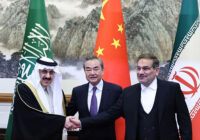Iran has the chance to benefit from new global alliances. China and Iran have had cultural, economic and political relations for thousands of years. During the colonial times in the last 200 years, they were isolated, but now they are restoring their ancient relations. As late as March 2021, they signed a 25-year cooperation agreement.
On March 10, in Beijing, Iran and Saudi Arabia signed an agreement restoring their diplomatic relations. This will have ramifications for the United States: That action was not in line with US policy, which sees China as a competitor and adversary. The Saudi action surprised the US since Saudi Arabia has been a client of the US since 1945. The Saudi move could have only happened in the changing world.
The US can get clues from Saudi Arabia’s choice and face reality by adjusting its foreign policy. The US could stop interferences, coups and invasions in other countries, particularly Iran. It could give up on “regime change” in Iran and apologize for the 1953 coup that overthrew Iran’s first-ever democratic government. It must stop supporting ethnic cleansing and genocide against other people, especially the native Palestinians. By taking those vital steps, the US would improve relations with Iran and decrease tensions in the world.
Iran’s mullahs, or religious leaders, can also take crucial steps to restore the economy and pacify the country’s young generation. Presently, the mullahs do not walk the talk. The father of the 1979 Iranian revolution, Ayatollah Ruhollah Khomeini, purportedly warned the mullahs: “Clergy, wake up; now, it is not time to talk … think about people’s problems! Discussion by itself is of no use.” Mullahs have a responsibility within the state of Iran: to listen to the people and adjust their policies accordingly.
Mullahs live in a fantasy world
In my recent visit to Iran, I noticed that the mullahs keep ignoring the advice from the Islamic Revolution’s father. They continue competing with one another for high political positions while the country faces serious economic issues. They claim that the main culprit for poverty is the US’ brutal economic sanctions against the nation that violate the UN Charter. Although that is partially true, the real threats to the regime are the mullahs who have failed to do what they say, listen to the people and address domestic issues.
During my visit, Iranians kept saying that they get paid in local currency, rials, but buy in dollars. At the time, I could not understand their complaints after seeing perishable foods at low prices.
However, when I returned to the US and looked further into the matter, I recognized the reasons why the youth are protesting in Iran. I realized that the government privatized most national industries, including refineries, petrochemicals and steel. It is still subsidizing them and providing them with cheap crude oil and other raw materials, expecting the finished products to include reasonable profit for sale in the country. However, those outfits have been exporting their products and selling them in dollar values in a country where the wages are low and labor is very cheap. The companies have no regulatory oversight. Their shareholders are profiting incredibly while contributing immensely to the nation’s inflation and poverty.
Despite the arduous efforts of the new President Ibrahim Raisi, the economy of Iran is still in shambles with an inflation rate below 40%. Corruption and nepotism are widespread, ranking the country 147 among 180 countries in transparency. Women are still widely discriminated against by the government despite great women’s strides in law, medicine, journalism, engineering and other scientific fields. Ethnic groups such as the Baluchis and Kurds remain among the least educated. Thus, indigenous groups like them are easy prey to terrorist groups like Jundallah and Komalah, armed and financed by the US and allies.
How could Iran’s religious leaders let this issue grow so large? Due to their lack of knowledge of the modern world, the mullahs have entrusted running the government chiefly on their staff, ministers and supporting personnel, mostly educated in the West. The staff have pushed for free enterprise in a laissez-faire way without regulatory oversight. They have pressed to privatize the national industries, particularly oil and steel. Once these industries are privatized, they and their relatives and friends buy large shares, aiming for low production costs and maximal profits. They have formed Iran’s oligarchs. Like in Russia, the oligarchs manipulate the market. Consequently, Iran’s inflation has hit the roof and poverty is fast expanding!
On the surface, Iranians think that the mullahs are ruling the country. In reality, the oligarchs are running the nation. In the 1950s, Mohammad Mosaddegh fought with Britain for Iran’s oil nationalization. For that effort, he lost his power and was forced into exile in his house until his death. Sadly, the mullahs have foolishly given away the national treasures to a selected group who have emerged as Iran’s oligarchs.
The oligarchs convert much of their profits into gold and foreign currencies. Those actions have further devalued the local currency, causing public panic. With the money made in Iran, they buy properties in Istanbul, London, Montreal, Los Angeles and other popular foreign cities. In those foreign cities, their children whose mere existence and liberal lifestyle are indebted to the mullahs, are often among the instigators against the mullahs.
The oligarchs own private banks that invest and operate commercial facilities across the country, unavailable for sale or rent, counting on higher profits in the future. This is when millions of families are looking for residence.
Under the mullahs, it never occurred to the oligarchs that the investments were not earned by them or their parents but entrusted to them by the nation. Thus, they should make their products affordable to buy by Iranians.
Seven simple steps for mullahs to save Iran
The forecast for Iran’s future is gloomy. Execution and imprisonment are not the answers to domestic issues. For Iran to survive in its present form, drastic actions must be taken. As Mosaddeq brought the oil back to Iran from the British, the mullahs must bring back the economy to Iranians from the oligarchs. To start, they could take these seven steps.
First, stop vying for power. Clean up corruption and nepotism. Choose qualified personnel who are clean from bribery, embezzlement, peddling, or any other activity financially benefiting them or people close to them. Learn how Singapore brought corruption under control.
Second, implement effective management, accountability and transparency programs. Train managers on how to use the resources effectively to meet the targets before deadlines. Learn how Switzerland managed affairs.
Third, address inflation by tightening government spending, overseeing banks and controlling trade. Limit ownership of foreign currency and precious metals like gold. Require the use of only national currency in domestic dealings. Ensure banks are involved in only banking (accepting deposits from the people with a guarantee that the funds will be there when needed and making loans available to them, based on certain reasonable conditions). Learn from Russia on how to manage the inflation rate. Despite facing tough sanctions, Russia managed an inflation rate of 11.9%, and even Afghanistan under the Taliban controlled an inflation rate of 5.2% in December 2022.
Fourth, temporarily take over imports and exports for all essential goods and services. When the products are sold to distributors, define the profit margin clearly. Increase trade with neighboring countries. Implement regulatory oversight on at least all oil and steel industry production. Give attention to China’s trade regulations.
Fifth, attend to women’s issues and include more in decision-making processes. Remove all barriers that prevent women from rising to power. On equality, learn from Sweden.
Sixth, help the ethnic groups such as Baluchis and Kurds and address their economic and other issues. Promote ethnic diversity in all workplaces with an objective of ethnic equality. Sweden provides a good example.
Seventh, get away from depending on oil revenues for the budget. Promote investments and increase domestic production for exports. Look into the world’s top agricultural exporters.
Despite the benefits of these necessary steps, they are merely bandages on wounds. Above all, culture must be changed. Until the 1979 fall of the monarchy, the Shah made law at his will. He was accountable to no one. People adopted sycophancy to get royal attention. Powerful families practiced nepotism to strengthen their hold on power and demanded bribes to keep their living status. People lied to safeguard their lives and honors. Although Iranians finally got a constitution about 100 years ago, the monarch gave that little attention. Naturally, people followed the king, giving little attention to law and order. The long-term solution is to change the thoughts and false beliefs. From an early age in school, pupils must be taught to practice honesty and respect law and order. Overcoming poor habits takes a generation.
The views expressed in this article are the author’s own and do not necessarily reflect Fair Observer’s editorial policy.
Support Fair Observer
We rely on your support for our independence, diversity and quality.
For more than 10 years, Fair Observer has been free, fair and independent. No billionaire owns us, no advertisers control us. We are a reader-supported nonprofit. Unlike many other publications, we keep our content free for readers regardless of where they live or whether they can afford to pay. We have no paywalls and no ads.
In the post-truth era of fake news, echo chambers and filter bubbles, we publish a plurality of perspectives from around the world. Anyone can publish with us, but everyone goes through a rigorous editorial process. So, you get fact-checked, well-reasoned content instead of noise.
We publish 2,500+ voices from 90+ countries. We also conduct education and training programs
on subjects ranging from digital media and journalism to writing and critical thinking. This
doesn’t come cheap. Servers, editors, trainers and web developers cost
money.
Please consider supporting us on a regular basis as a recurring donor or a
sustaining member.
Will you support FO’s journalism?
We rely on your support for our independence, diversity and quality.







Comment